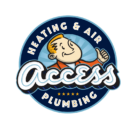Did you know that the air inside your home can be up to five times more polluted than the air outside? This is because most homes are not well-ventilated, and indoor air quality can be affected by a variety of factors, including seasonal changes.
In this article, we will discuss how seasonal changes affect indoor air quality and what you can do to improve it. We will also cover some common symptoms of poor indoor air quality and provide some tips for reducing exposure.
What are the Negative Effects of Poor Indoor Air Quality?
The most common symptoms of poor indoor air quality include headaches, fatigue, dizziness, irritated eyes and skin, coughing, wheezing, and even a stuffy nose.
These issues tend to be worse during the winter months because cold temperatures make it more difficult for ventilation systems to rid homes of pollutants.
How Do Seasonal Changes Affect Indoor Air Quality?
In the wintertime, humidity levels drop drastically due to the use of space heaters and fireplaces. Low humidity can cause dry air which not only irritates the skin but also dries out nasal passages leading to an increased risk of respiratory infections.
Additionally, cold weather typically means windows staying closed which traps pollen and other allergens indoors.
During the summer months, warmer temperatures mean windows and doors stay open which can lead to increased levels of pollen and other allergens in the home. Hot weather also causes a rise in humidity levels which can cause mold and mildew to grow.
What Can You Do to Improve Indoor Air Quality?
There are several things you can do to help improve air quality in your home including:
- Use an air purifier or filter system – Look for a unit that removes particles such as dust mites, pet dander, pollen, smoke, mold spores, bacteria, viruses, and VOCs.
- Keep your home clean and well-ventilated – Vacuum carpets regularly with a HEPA filter vacuum cleaner and open windows when the weather permits.
- Change your air filters regularly – This helps to reduce pollutants in the air and improve ventilation.
- Avoid using products containing VOCs – Many household cleaners, paints, and solvents contain volatile organic compounds (VOCs) which can be released into the air if used improperly.
- Have your home tested for radon levels – Radon is a naturally occurring gas that can cause health problems if it accumulates inside homes.
What are the Most Common Sources of Poor Indoor Air Quality?
The most common sources of indoor air pollution include mold, dust mites, smoke, pet dander, and VOCs from household products.
Mold can grow anywhere in your home where there is moisture or water damage. Dust mites thrive in warm and humid environments so it’s important to keep humidity levels between 30-50%. Smoke from cigarettes or candles can be a major source of indoor air pollution as well. Pet dander can also cause respiratory problems for some people.
Finally, VOCs from household products such as paint, cleaning supplies, and certain furniture pieces can cause an array of health concerns if used incorrectly.
How Can an HVAC Company Help?
Your home’s heating, ventilation, and air conditioning (HVAC) system needs regular maintenance to ensure it is working properly. An HVAC company can help with this by performing routine inspections and cleaning the system of any dirt or debris.
They can also install filtration systems that will help to reduce airborne allergens and pollutants. It’s important to select an HVAC company that has experience dealing with indoor air quality issues so they can recommend the best solutions for your home.
How to Improve Indoor Air Quality This Winter
To help improve indoor air quality this winter, make sure you are changing your air filters regularly and keep windows closed when the weather is cold. Additionally, use an air purifier or filter system to help reduce pollutants in the air and limit your use of products that contain VOCs.
Receive an Indoor Air Quality Inspection from Access Heating & Air Conditioning
If you’re concerned about the air quality in your home, contact Access Heating & Air Conditioning for an indoor air quality inspection.
Our highly experienced technicians are experienced in helping to identify and eliminate sources of poor indoor air quality, so you and your family can breathe easy this winter.
